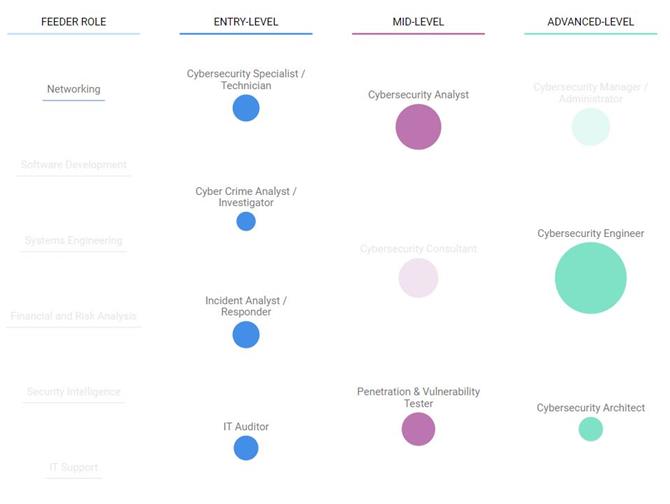How To Transition From Computer Networking to Cybersecurity
Many IT roles now include some cybersecurity responsibilities, and once you get that taste, you may want to do more. Perhaps you’re even thinking about pursuing a cybersecurity career.
If you currently work in networking, software development, systems engineering, financial and risk analysis, security intelligence, or IT support, you’re in luck! CompTIA's CyberSeek tool has outlined cybersecurity career pathways that begin with these roles, and each pathway includes salary and job data. Read on to discover how your computer networking skills can help you prepare for a cybersecurity career.
Networking to cybersecurity: The skills you need
Your experience in computer networking and IT infrastructure gives you transferable skills that match those required for many job roles.
According to Cyberseek, employers listed over 437,000 job postings in the United States seeking candidates with cybersecurity-related skills between September 2023 and August 2024, which include the following:
|
GENERAL TECH SKILLS REQUESTED |
CYBERSECURITY SKILLS TO ADD |
|
Computer Science |
Python (Programming Language) |
|
Automation |
Network Routing |
|
Firewall |
System Administration |
|
Operating System |
Active Directory |
|
Network Engineering |
Project Management |
If you have any of the above skills, highlighting them on your resume and during interviews can help position you as an excellent candidate for a large number of jobs currently hiring, according to CyberSeek.
How to learn these skills
CompTIA certifications cover the skills you need to move from networking to cybersecurity, and each certification has a full suite of training products so you can tailor your studying to how you learn best.
If you’re not sure which certification is right for you, take a look at the CompTIA Cybersecurity Career Pathway. CompTIA Security+ validates the baseline skills needed to perform core security functions, and CompTIA Cybersecurity Analyst (CySA+) and CompTIA PenTest+ cover the intermediate skills required for defensive and offensive cybersecurity, respectively. Once you have some experience under your belt, CompTIA Linux+ is the perfect complement to your cybersecurity skills.
Once you choose which certification is right for you, download the exam objectives to see what’s covered and then select your training solution. You can take a class or self-study with CertMaster eLearning solutions.
CompTIA CertMaster Learn
CertMaster Learn is a self-paced, comprehensive online learning experience that helps you gain the knowledge and practical skills necessary to be successful on your CompTIA certification exam—and in your IT career. CertMaster Learn helps you stay on track with your studies, while robust analytics bring awareness of your strengths and weaknesses.
CompTIA CertMaster Labs
CertMaster Labs makes it easy for you to practice and apply your skills in real workplace scenarios in preparation for the certification exam. All lab activities use real equipment and software, are based on scenarios found in the workplace, and align with CompTIA exam objectives.
Networking to cybersecurity: The education you need
According to CyberSeek, the following educational requirements represent the percentage of online job listings requiring either less than a bachelor's degree, a bachelor's degree, or a graduate degree:
- 17% do not require a bachelor’s degree.
- 65% require a bachelor’s degree.
- 18% require a graduate degree.
While the majority of these jobs require some form of higher education, not all require a degree! Don’t count yourself out of a job if you have relevant certifications and experience.
Learn about the other CyberSeek pathways and feeder roles
Networking to cybersecurity: The jobs you could get
Computer networking can lead you from an entry-level to an advanced-level cybersecurity job down the line, and with this feeder role, the possibilities are limitless!

Entry-level jobs
Average salaries:
- Cybersecurity specialist/technician: $88,149
- Cybercrime analyst/investigator: $100,150
- Incident and intrusion analyst: $101,130
- IT auditor
Mid-level jobs
Average salaries:
- Cybersecurity analyst: $115,795
- Cybersecurity consultant: $125,243
- Penetration and vulnerability tester: $132,457
Advanced-level jobs
Average salaries:
- Cybersecurity manager: $152,403
- Cybersecurity engineer: $143,992
- Cybersecurity architect: $150,989
Networking to cybersecurity: The certifications you need
According to CyberSeek, of the 168,365 job openings in the networking feeder role, the following certifications are the most requested by IT employers.
CompTIA certifications
- CompTIA Security+: Validates the baseline skills necessary to perform core security functions and pursue an IT security career.
- CompTIA CySA+: Applies behavioral analytics to networks and devices to prevent, detect, and combat cybersecurity threats through continuous security monitoring.
- CompTIA PenTest+: Confirms the skills of cybersecurity professionals tasked with penetration testing and vulnerability management.
Other certifications
- Cisco Certified Network Associate (CCNA)
- Cisco Certified Network Professional (CCNP)
- IAT Level II Certification
- Cisco Certified Internetwork Expert (CCIE)
As you can see, transitioning from networking to a career in cybersecurity is easier than you may think. Many of the skills you already have are common skills needed for a successful career in cybersecurity. With its detailed, actionable data about supply and demand in the cybersecurity job market, CyberSeek is a great resource to help you learn what skills and certifications are necessary for the cybersecurity job of your dreams.
Check out the CompTIA Cybersecurity Career Pathway to see how CompTIA certifications can help you get into cybersecurity and advance your cybersecurity career.